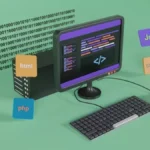Introduction
In recent years, the idea of the Metaverse has gained a lot of traction. The potential for this virtual reality to transform our experiences and alter many facets of our life is immense. Users can communicate, travel, and build in a number of different virtual worlds that are all linked together. In this piece, we’ll look into the Metaverse and investigate how it’s changing the ways in which we interact with, collaborate in, and are connected across digital spaces.
Defining the Metaverse
When people talk about “the Metaverse,” they’re referring to a shared virtual realm that includes several different virtual worlds. It goes beyond the confines of certain applications or games to provide a cohesive environment in which users can move freely across online spaces and interact with one another. It’s not confined to any one piece of hardware, but rather operates as a network that encompasses AR, VR, and other cutting-edge mediums.
Enhanced Social Interactions
The Metaverse has a profound effect because of how it improves communication and community within virtual worlds. Users can interact with people they know and those they have never met before from all over the world in an interactive and social environment. The Metaverse eliminates geographical barriers, opening up new possibilities for human interaction.
Boundless Opportunities for Commerce and Entertainment
The potential for business and leisure in the Metaverse is practically limitless. Companies now have the option to open up shop online, providing customers with a more flexible and individualised buying experience. By sharing their creations online, artists, singers, and content makers can gain exposure to a massive audience and earn money from their efforts. Hosting events, concerts, and performances virtually removes the need for expensive and inaccessible physical locations, expanding their potential audience to include people all over the world.
Transforming Education and Work
The Metaverse is also altering the nature of education and the workforce. Immersive and interactive learning experiences provided by virtual classrooms and training environments allow students to explore concepts and collaborate with peers in new ways. Transcending geographic limitations and releasing previously unattainable levels of productivity and innovation, remote work is revolutionised by the ease with which professionals may collaborate and communicate in virtual office environments.
Ethical Considerations and Challenges
The growth of the Metaverse poses new moral questions and difficulties. To guarantee a fair and secure online space, it’s important to address concerns like privacy, security, digital ownership, and governance. To avoid additional inequalities, it is also important to close the digital divide and make resources available to everyone.
Sustainable Living and Environmental Impact
The Metaverse may also help people live more sustainably and have a smaller environmental effect. The need for travel can be greatly reduced by holding meetings and events virtually, which reduces carbon emissions. Additionally, virtual environments and experiences can foster environmental education and awareness, encouraging people to adopt sustainable lifestyle choices.
Ethical Considerations and Challenges
There are growing moral questions and difficulties as the Metaverse develops. To establish a secure and fair virtual environment, concerns including privacy, security, digital ownership, and governance must be carefully considered. Furthermore, closing the digital divide and providing accessible for everyone are essential to stop additional inequalities.
The metaverse is a dynamic idea that has the ability to completely transform our experiences. The Metaverse creates a common area for communication and collaboration between virtual worlds, opening up a world of possibilities in many facets of our existence.
The Metaverse’s core function is to facilitate improved social interactions. It brings individuals from all over the world together and gives them the chance to interact, communicate, and share experiences in a setting that is both intensely immersive and collaborative. Virtual environments allow for the gathering, exploration, and interaction of friends and family while removing geographical restrictions.
Additionally, the Metaverse offers countless chances for business and enjoyment. Businesses can create online markets and storefronts that provide distinctive and individualized buying experiences to a worldwide customer base. A large and diverse population can be reached by artists, musicians, and content makers, and virtual events and performances can enthrall millions of people worldwide.
The Metaverse is changing conventional methods in the fields of labor and education. Students can explore ideas and creatively work with classmates in virtual classrooms and learning settings that offer interactive and immersive learning experiences. In virtual office environments, professionals may cooperate and communicate without difficulty, overcoming geographic barriers and promoting productivity and innovation.
The Metaverse also broadens people’s personal and cultural experiences. Users get access to a wealth of knowledge and cultural heritage by immersing themselves in digital recreations of historic sites, art galleries, and museums. Customizable virtual identities and avatars enable self-expression and the exploration of many personas, promoting personal development and exploration.
The Metaverse has potential uses outside of the social and personal spheres. Through virtual simulations and collaborations, it has the potential to change healthcare and research. Researchers can collaborate in virtual labs to hasten scientific discovery while medical practitioners can practice and hone their abilities in realistic virtual surroundings.
Conclusion
In conclusion, by connecting virtual worlds and establishing a common area for interaction, cooperation, and exploration, the Metaverse is redefining experiences. The Metaverse has the ability to change how we interact with digital surroundings, from improved social connections and immersive commerce to revolutionary experiences in work, education, healthcare, and culture. Harnessing the full potential of the Metaverse and building a future where the lines between the virtual and physical worlds are completely fused would require embracing responsible development and taking ethical issues into account.











